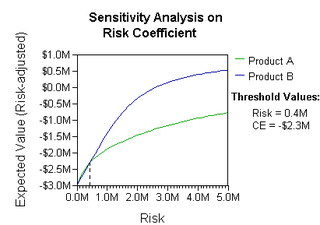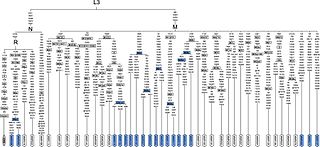
Multiple-criteria decision-making (MCDM) or multiple-criteria decision analysis (MCDA) is a sub-discipline of operations research that explicitly evaluates multiple conflicting criteria in decision making. It is also known as multiple attribute utility theory, multiple attribute value theory, multiple attribute preference theory, and multi-objective decision analysis.
ÉLECTRE is a family of multi-criteria decision analysis (MCDA) methods that originated in Europe in the mid-1960s. The acronym ÉLECTRE stands for: ÉLimination Et Choix Traduisant la REalité.
The superiority and inferiority ranking method is a multi-criteria decision making model (MCDA) which can handle real data and provides six different preference structures for the system user. MCDM is a sub-discipline of operations research that explicitly evaluates multiple conflicting criteria in decision making, both in daily life and in settings such as business, government and medicine.
Bernard Roy was an emeritus professor at the Université Paris-Dauphine. In 1974 he founded the "Laboratoire d'Analyse et de Modélisation des Systèmes pour l'Aide à la Décision" (Lamsade). He was President of Association of European Operational Research Societies from 1985 to 1986. In 1992 he was awarded the EURO Gold Medal, the highest distinction within Operations Research in Europe. In 2015 he received the EURO Distinguished Service Award.
Decision-making software is software for computer applications that help individuals and organisations make choices and take decisions, typically by ranking, prioritizing or choosing from a number of options.
In decision theory, the weighted sum model (WSM), also called weighted linear combination (WLC) or simple additive weighting (SAW), is the best known and simplest multi-criteria decision analysis (MCDA) / multi-criteria decision making method for evaluating a number of alternatives in terms of a number of decision criteria.
The decision-making paradox is a phenomenon related to decision-making and the quest for determining reliable decision-making methods. It was first described by Triantaphyllou, and has been recognized in the related literature as a fundamental paradox in multi-criteria decision analysis (MCDA), multi-criteria decision making (MCDM) and decision analysis since then.
In decision-making, a rank reversal is a change in the rank ordering of the preferability of alternative possible decisions when, for example, the method of choosing changes or the set of other available alternatives changes. The issue of rank reversals lies at the heart of many debates in decision-making and multi-criteria decision-making, in particular.
The Preference Ranking Organization METHod for Enrichment of Evaluations and its descriptive complement geometrical analysis for interactive aid are better known as the Promethee and Gaia methods.
Proaftn is a fuzzy classification method that belongs to the class of supervised learning algorithms. The acronym Proaftn stands for:, which means in English: Fuzzy Assignment Procedure for Nominal Sorting.
In multiple criteria decision aiding (MCDA), multicriteria classification involves problems where a finite set of alternative actions should be assigned into a predefined set of preferentially ordered categories (classes). For example, credit analysts classify loan applications into risk categories, customers rate products and classify them into attractiveness groups, candidates for a job position are evaluated and their applications are approved or rejected, technical systems are prioritized for inspection on the basis of their failure risk, clinicians classify patients according to the extent to which they have a complex disease or not, etc.
DecideIT is a decision-making software for the Microsoft Windows operating system. It is based on multi-criteria decision making (MCDM) and the multi-attribute value theory (MAVT). It supports both value tree analysis for multi-attribute decision problems as well as decision tree analysis for evaluating decisions under risk and can combine these structures in a common model.
The VIKOR method is a multi-criteria decision making (MCDM) method. It was originally developed by Serafim Opricovic in 1979 to solve decision problems with conflicting and noncommensurable criteria. It assumes that compromise is acceptable for conflict resolution and that the decision maker wants a solution that is the closest to the ideal, so the alternatives are evaluated according to all established criteria. VIKOR then ranks alternatives and determines the solution named compromise that is the closest to the ideal.
D-Sight is a company that specializes in decision support software and associated services in the domains of project prioritization, supplier selection and collaborative decision-making. It was founded in 2010 as a spin-off from the Université Libre de Bruxelles (ULB). Their headquarters are located in Brussels, Belgium.

The Association of European Operational Research Societies (EURO) is a regional grouping within the International Federation of Operational Research Societies (IFORS) whose aim is to promote Operational Research throughout Europe. It was established in 1975.
Stochastic multicriteria acceptability analysis (SMAA) is a multiple-criteria decision analysis method for problems with missing or incomplete information.

EWG EU/ME, the EURO Working Group on Metaheuristics, formerly referred to as EU/ME – the metaheuristics community, is a working group the main purpose of which is to provide a platform for communication among researchers in the field of metaheuristic optimization, practitioners interested in applying metaheuristic optimization techniques in practice, developers of optimization software, and the general public.
Valerie Belton, commonly known as Val Belton, is a retired professor of management science at University of Strathclyde. She is a researcher who has worked on the design and application of multi-criteria decision making (MCDM) approaches for over 30 years. She co-authored a book on this field Multicriteria Decision Analysis: An Integrated Approach, that was released in 2002. She has attempted to incorporate multi-criteria decision analysis with problem structuring techniques, system dynamics, and other analytical approaches. She has a number of scholarly articles to her name and served as the editor of the journal Multi-Criteria Decision Analysis.

Value tree analysis is a multi-criteria decision-making (MCDM) implement by which the decision-making attributes for each choice to come out with a preference for the decision makes are weighted. Usually, choices' attribute-specific values are aggregated into a complete method. Decision analysts (DAs) distinguished two types of utility. The preferences of value are made among alternatives when there is no uncertainty. Risk preferences solves the attitude of DM to risk taking under uncertainty. This learning package focuses on deterministic choices, namely value theory, and in particular a decision analysis tool called a value tree.
The Hellenic Operational Research Society (HELORS) is the official non-profit society for the scientific field of Operations Research in Greece. The society is a member of the European umbrella organization, the Association of European Operational Research Societies, and of the International Federation of Operational Research Societies.




